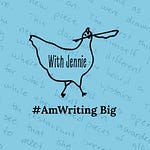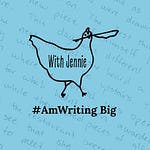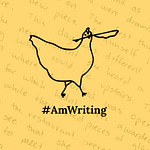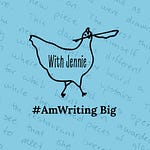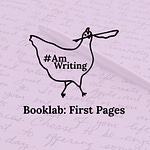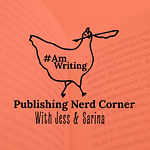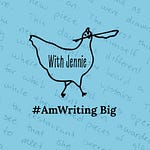In this episode, Jennie digs into the sneaky ways writers “play small”—circling endlessly around an idea, polishing the same chapters, getting lost in research, or waiting for perfect timing instead of taking real action. With stories from her years as a book coach, including one writer who finally broke free from years of fear and went on to become a full-time author, Jennie shows how smallness hides behind busyness and perfectionism. She challenges you to spot where you’re holding back and take the courageous step toward playing big.
Transcript Below!
SPONSORSHIP MESSAGE
Hey, this is Jennie Nash, and I wanted to invite you to check out my Substack newsletter, The Art & Business of Book Coaching. It’s totally free unless you choose to support me, and it’s secretly really great for writers. The reason is that book coaches are in the business of helping writers do their best work. So I’m always talking about writer mindset and things like helping a writer find their structure or find an agent or find their position in the marketplace. If you’re considering investing in having somebody help you, it’s a great way to get prepared to know who you might want to pick and what you might want to ask of them. You’ll get an inside peek at the way that the people who are in the business of helping writers think about writers, and so in that way, it can help you become a better writer just by tuning in. I have a lot of writers following me over there, so if you’re interested, come check it out you can find it at substack.com/@JennieNash. That’s substack.com/@JennieNash, and it’s J-E-N-N-I-E.
EPISODE TRANSCRIPT
Hi, I’m Jennie Nash, and you’re listening to the Hashtag AmWriting Podcast. This is a Write Big Session, where I’m bringing you short episodes about the mindset shifts that help you stop playing small and write like it matters.
Today, we’re talking about playing small—and what exactly it is—because playing small is sneaky. Writers are not going around saying, “I want to hold myself back,” or, “I’m giving in to my fear,” or, “I’m making decisions to protect myself.” Instead, they tell themselves that they’re being realistic.
Maybe they think that they need more training, or they need to take more courses, or they need to take more time. But as a book coach, I see the same patterns over and over again in writers playing small — and this is what it looks like.
It’s this person, who I don’t see very often, but whenever I do see them—maybe once or twice a year—they always tell me that they’re circling around the idea of writing a book. It’s the same book that they’ve been circling around all these years, and they feel compelled to tell me that they’re still thinking about it—they’re still just about to do that someday, when they have time.
The smallness comes in never even starting.
I also think of the writer who polishes the same three chapters over and over again until they just shine brightly and there’s not one single, solitary thing wrong with them. But that writer never moves forward with their draft. They never actually get to the point where they’re going to finish, and then have to decide how to revise that book, or whether to take it out into the world, or even show it to anyone. They just noodle around with those same chapters in this endless loop of procrastination.
So again, it’s not taking action.
You also see this with nonfiction writers, or memoir writers, or sci-fi writers—where they focus incredibly deeply on their world-building or their research, and they have copious notes and spreadsheets and all kinds of information that they’re gathering so that, when they’re ready to write, they’ll have all this info—but they never actually get ready to write. They just stay stuck in the loop of research.
Perhaps the most poignant story I have of a writer playing small comes from a conference that I went to many years ago. I met this writer who had been going to the same conference for about five years, and she was getting ready to pitch. She actually had come to me in a kind of speed-dating situation, where you worked with an expert to get your pitch ready before you went in to the agents to pitch, and I thought her pitch was really good. I thought her material was really good, and we worked on tweaking it a little bit.
And then I said, you know, had she ever pitched before? Was this her first time? And she said, “No, I’ve been coming to this conference all these years, and I’ve been pitching every year.”
And I said, “Well, what happened all those years?” And she said that each one of those years, she had agents request to send in her manuscript. She had this collection of agents who were waiting for her manuscript, and she had never sent it to them because she didn’t think that it was ready.
She kept coming to the conference, kept going to these pitches, kept getting requests, and never sending the manuscript in. She thought that she would continue to work on it—to make it as good as it could be—before she took that leap and sent those pitches in.
And surely my mouth hung open in shock, because this just seemed so sad to me—and a perfect example of playing small. And so, instead of working on her pitch, I used my time with her to work on her mindset and to help her try to find and tap into that bravery to, this year, actually do it—to actually send the work in. And maybe go back to those agents from years past and send it to them as well. Sometimes there’s a period of time when the agents will still welcome those pitches—or not.
But the point was, it was time for her to get out there and pitch, without a doubt. And after that conference, she did, in fact, get more requests to submit—and she did submit—and now, all these years later, she’s a very successful writer. She’s actually working on her third series. She is a full-time writer. She’s made the leap to be that, which is a thing so many people want to be.
It was just one moment of fear that she had to get over. And I said in the last episode that playing big rarely happens in one moment — but sometimes it does. Sometimes it’s literally just hitting the send key and saying, “Okay, I’m doing this. I’m putting it out there.” And that’s what this writer needed to do to make that shift from playing small to playing big.
It’s very easy to just stay busy with our writing—to stay productive—and to never do the work that’s actually going to get us the thing we want. Playing small often looks like busyness or it looks like waiting for permission—waiting for more time, for perfect pages, for someone else to open the door and welcome us in.
But this is just another form of hiding. Playing small means not stepping forward. It means not sending that pitch, not finishing the draft, not carving out the time to do the work, and constantly coming up with reasons why it’s not happening.
So the reflection I want to leave you with today is to think about where you know you’re playing small—and where you know you need to shine the light of courage and bravery in order to make that shift and play big.
The place where you’re playing small is probably glaringly obvious to you, so you probably know. And I would encourage you to write it down so you can look at it—maybe share it. Everything is better when it’s shared and brought into the light.
And once you do that, you can take action toward making the shift and playing big. Until next time, stop playing small and write like it matters.
Narrator
The Hashtag AmWriting Podcast is produced by Andrew Perrella. Our intro music, aptly titled Unemployed Monday was written and played by Max Cohen. Andrew and Max were paid for their time and their creative output, because everyone deserves to be paid for their work.



